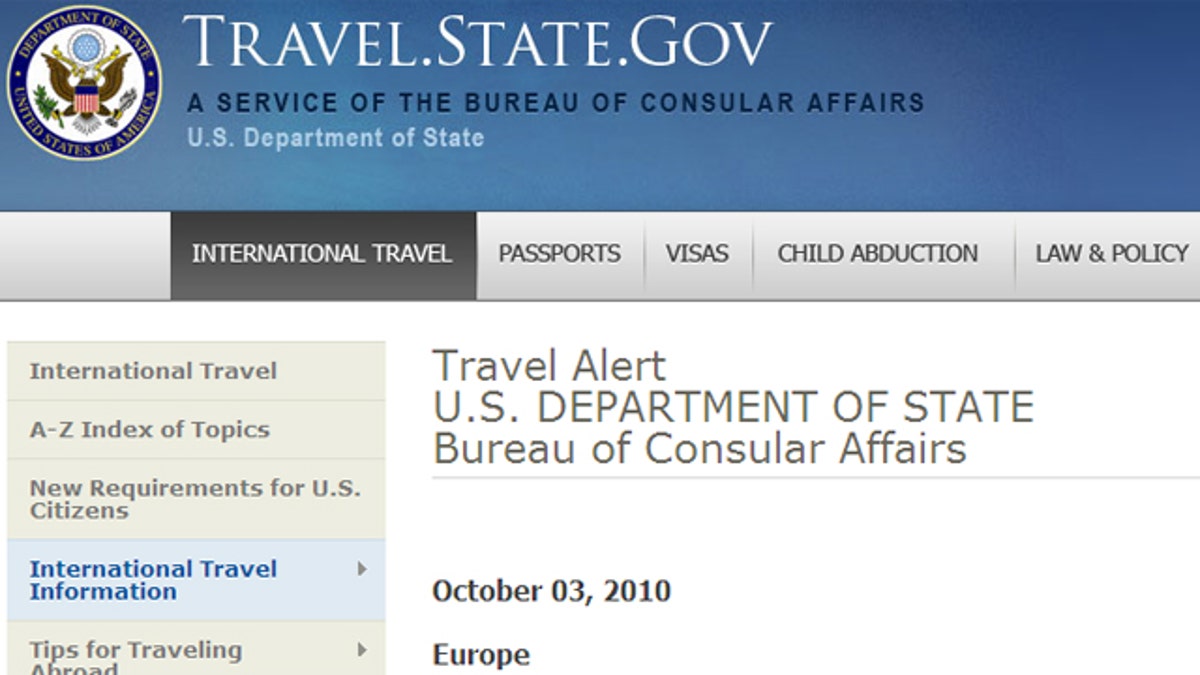
(U.S. Department of State)
On Sunday, October 3rd, the U.S. Department of State issued a travel alert for Europe, notifying Americans living or traveling on the continent of the potential for terrorist attacks, effective through January 2011. Interpretations in the media have ranged from frustration (This information isn't helpful) to dismissal (The government is just covering its ass -- screw it), however, most have found a middle ground of sober confusion. Here we break down the situation based on the text of the travel alert, the subsequent briefing with Under Secretary of State Management Patrick F. Kennedy, a look at the recent history of travel alerts and travel warnings, and a dose of common sense, all to find out whether you should be worried about traveling.
What the State Department travel alert said
The text of the travel alert is straightforward: According to U.S. and European intelligence, “al-Qa’ida and affiliated organizations continue to plan terrorist attacks.” Past targets for violence -- subway and rail systems, aviation and maritime services, tourist infrastructure -- are considered likely future targets, and so we're encouraged to be aware of our surroundings and to be fastidious about taking safety precautions.
Taking the alert at face value, a sensible person would stay out of Europe. But decoding the State Department language leaves us with a more nuanced interpretation.
What the State Department travel alert means
In a media briefing following the alert, Under Secretary Kennedy was clear about the State Department's position: “We are not, repeat not, advising Americans not to go to Europe. That is not, this is an alert, and we put out an alert... to ensure that American citizens are aware of the possible incidents.” Specifically, the State Department drops alerts for short-term conditions that pose significant risks to the security of Americans, which can be anything from weather (typhoon season in the Pacific) to an attention-grabbing event (2010 Commonwealth Games in India) to our present ordeal. A more acute threat would be called a "travel warning." These mean business: Often they address prolonged conditions of intense violence, like the ongoing civil war in Yemen. (Christmas in Yemen... canceled.)
What's confusing is that terrorist threats can result in travel alerts or warnings, depending on their frequency or likelihood. The issue becomes murkier when we consider that neither a warning nor an alert preceded the bombings in London or Madrid, but that there was one after the Icelandic ash cloud. (Which is not to point fingers or to slight the ash cloud, Iceland's biggest export since the whole bankruptcy thing and all-together a pretty cool media event.) The truth is, figuring out what threat merits a travel alert versus a warning and weighing the political/economic fallout of issuance against the potential dangers is no exact science. There is randomness, chance and uncertainty.
Threatening weather patterns, while sometimes unpredictable, unfold publicly and without regard to human volition. Successful (objective sense of the word) terrorist attacks are by nature cloaked in secrecy until it's too late. Can typhoon season and potential acts of violence pose the same conceptual threat of danger? The whole thing still seems pretty vague.
----------
More from Askmen.com
How To: Avoid Hidden Holiday Travel Costs
Top 10: Tips For Traveling In Style
Fly Last-Minute & Travel Cheap
How To: Pack For A Business Trip
----------
What actions you should take
Fortunately, deciding what actions to take is not really a question of whether you have confidence in the government's threat-level ranking system. Assuming we believe Sunday's travel alert is based on an accumulation of credible intelligence, and knowing at the same time that Europe is no Yemen, explosion-wise, travelers should ask themselves one question: Do you feel lucky? People with a tendency toward paranoia and worry might be best-advised to bag the European vacation and take the family to California or someplace south of the border (but not rural Colombia, where narco-terrorists might kidnap you).
fortune favors…
Those who can live with a little danger should travel as planned and follow the State Department's practical safety measures like pre-trip registration with the U.S. Embassy (it contact you in an emergency), avoiding political rallies or public demonstrations, carrying a phone with contact information for the embassy, avoiding travel in large groups with published itineraries, and taking direct flights to avoid layovers in major airports. If you do get taken hostage, the State Department advises this: “Think positively and avoid a sense of despair. You are a valuable commodity to your captors, and it is important to them to keep you alive and well.”
Fortune, they say, favors the prepared mind.




















